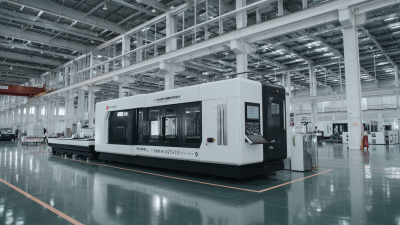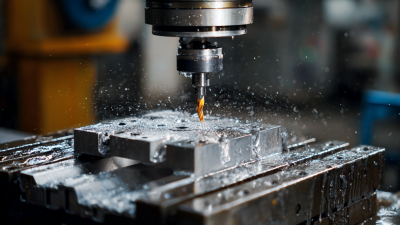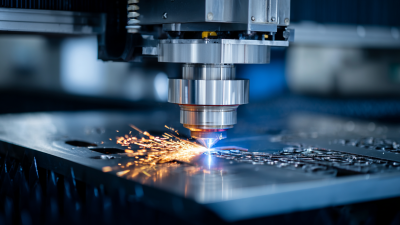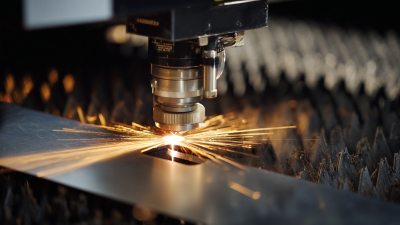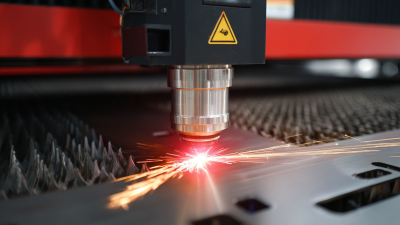
 In the rapidly evolving landscape of precision engineering,
turning CNC machines are emerging as pivotal tools that enhance efficiency, accuracy, and
productivity in manufacturing processes. According to a report by MarketsandMarkets, the global
CNC machine market is expected to reach $100 billion by 2025,
propelled by the increasing adoption of automation in various industries. Turning CNC machines,
known for their ability to create intricate parts with tight tolerances, play a crucial role in
this growth. By enabling manufacturers to produce components at unprecedented speeds while
maintaining high precision, these machines offer significant competitive advantages.
As industries strive for greater optimization, understanding the benefits of turning CNC machines
has become essential for businesses aiming to improve operational performance and meet the demands
of the market.
In the rapidly evolving landscape of precision engineering,
turning CNC machines are emerging as pivotal tools that enhance efficiency, accuracy, and
productivity in manufacturing processes. According to a report by MarketsandMarkets, the global
CNC machine market is expected to reach $100 billion by 2025,
propelled by the increasing adoption of automation in various industries. Turning CNC machines,
known for their ability to create intricate parts with tight tolerances, play a crucial role in
this growth. By enabling manufacturers to produce components at unprecedented speeds while
maintaining high precision, these machines offer significant competitive advantages.
As industries strive for greater optimization, understanding the benefits of turning CNC machines
has become essential for businesses aiming to improve operational performance and meet the demands
of the market.
In the realm of precision engineering, innovative turning CNC technologies are paving the way for unprecedented accuracy and efficiency. These advanced machines employ computer numerical control to execute complex machining tasks with remarkable precision, enabling engineers and manufacturers to produce intricate components that meet the strictest industry standards. The ability to manipulate materials with extreme accuracy not only enhances product quality but also significantly reduces waste, driving cost-effectiveness in production processes.
Tip: When selecting a turning CNC machine, consider the specific materials you will be working with, as different machines excel in handling various materials. Understanding the capabilities of your machine can optimize performance and output quality.
Furthermore, the integration of smart technologies and automation in turning CNC machines maximizes productivity. Features such as real-time monitoring and adaptive control systems allow for swift adjustments during operations, ensuring optimal performance regardless of shifts in material properties. This adaptation not only improves turnaround times but also bolsters the reliability of the manufacturing process.
Tip: Regularly investing in software updates and training for your team can enhance the utilization of your CNC technology, keeping your operations at the forefront of precision engineering advancements.
| CNC Machine Model | Spindle Speed (RPM) | Maximum Torque (Nm) | Precision (µm) | Material Compatibility |
|---|---|---|---|---|
| Model A | 12000 | 45 | 5 | Aluminum, Steel |
| Model B | 15000 | 60 | 3 | Titanium, Brass |
| Model C | 10000 | 50 | 4 | Plastic, Composite |
| Model D | 18000 | 75 | 2 | Steel, Alloy |
| Model E | 16000 | 70 | 6 | Aluminum, Plastic |
Turning CNC machines play a crucial role in precision manufacturing, offering a range of benefits that enhance both efficiency and product quality. One of the main advantages is their ability to produce complex geometries with high accuracy. The automated nature of CNC turning minimizes human error, ensuring that each component meets precise specifications consistently. This reliability is especially important in industries such as aerospace, automotive, and medical technology, where precision is not just preferred but essential for safety and performance.
In addition to precision, turning CNC machines streamline the manufacturing process by reducing setup times and increasing production rates. Their software-driven capabilities allow for quick adjustments and programming, enabling manufacturers to swiftly switch between different projects without extensive downtime. This versatility ensures that businesses can meet varying demands without sacrificing quality or speed. Moreover, the integration of advanced materials and tooling technology further enhances the machinability of difficult-to-work materials, making CNC turning a preferred choice in the competitive landscape of precision engineering.
In the rapidly evolving landscape of precision engineering, CNC turning machines are at the forefront of innovation, driven by automation and smart manufacturing technologies. The integration of automated systems not only improves efficiency but also enhances quality control, significantly reducing human error. Companies are increasingly adopting CNC turning solutions that incorporate IoT devices, allowing for real-time monitoring and data collection, which leads to informed decision-making and optimized production processes.
Tip: To stay competitive, invest in training for your team to familiarize them with the latest automation technologies. Understanding how to leverage these tools effectively can dramatically improve workflow and productivity.
As smart manufacturing continues to take hold, the emphasis on adaptability and customization becomes paramount. CNC turning machines equipped with advanced software now offer greater flexibility to accommodate varying production needs without sacrificing precision. This trend enables manufacturers to respond quickly to market demands, ensuring they're always one step ahead.
Tip: Implementing a modular CNC system can provide the scalability needed to adjust to changing production requirements. This flexibility enables manufacturers to pivot quickly, reducing downtime and increasing output.
Turning CNC machines have significantly advanced precision engineering, providing distinct advantages over traditional machining methods. According to a report by the market research firm Smithers Pira, CNC machining can achieve tolerances of up to +/- 0.005 inches, while traditional methods often manage around +/- 0.010 inches. This enhanced precision not only results in better quality products but also reduces material waste and rework costs.
Additionally, CNC machines offer a remarkable increase in efficiency. A comparative analysis by the International Journal of Advanced Manufacturing Technology indicates that CNC turning can deliver production speeds that are 20-40% higher than manual machining. This increase is attributed to the automation of complex tasks, minimizing human error and maximizing throughput. As industries demand faster turnaround times and tighter tolerances, turning CNC machines emerge as a crucial solution, aligning with the trend towards smarter manufacturing processes in today's competitive landscape.
The integration of turning CNC technology also reflects a broader move towards digitalization in manufacturing. According to a report from Deloitte, 59% of manufacturers are expected to adopt advanced manufacturing technologies by 2025, underscoring the importance of turning CNC systems. As companies prioritize efficiency and precision, the advantages of CNC machines over traditional methods will likely continue to reshape the engineering landscape.

The future applications of CNC turning in precision engineering industries are poised for remarkable growth, driven by advancements in technology and the increasing demand for precision manufacturing. According to a report, the United States machine tools market is expected to reach USD 19.2 billion by 2032, growing at a CAGR of 4.0%. This growth reflects the rising need for sophisticated machining processes, particularly in sectors like aerospace and medical technology, where high quality and accuracy are paramount.

Moreover, the global precision turned product manufacturing market is projected to expand significantly, with estimates suggesting it will reach USD 196.11 billion by 2034, up from USD 108.79 billion in 2024. This surge demonstrates the pivotal role CNC turning machines will play in producing intricate components. As industries increasingly integrate artificial intelligence into manufacturing processes, the capabilities of CNC turning will further enhance, allowing for smarter, more efficient production workflows. Consequently, this technological evolution will not only meet but exceed the precision demands of modern engineering challenges.
